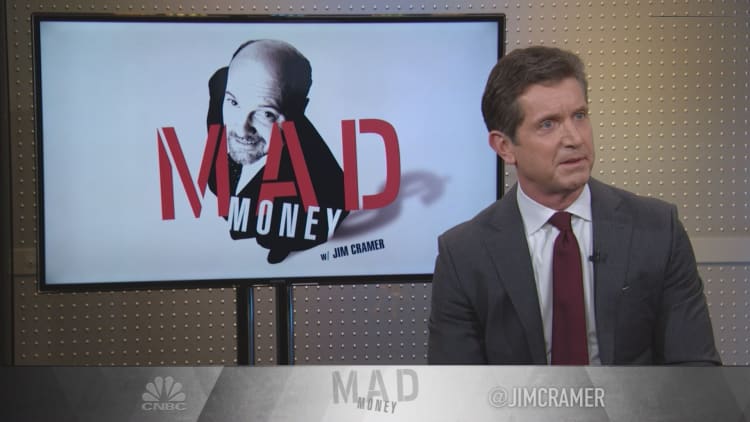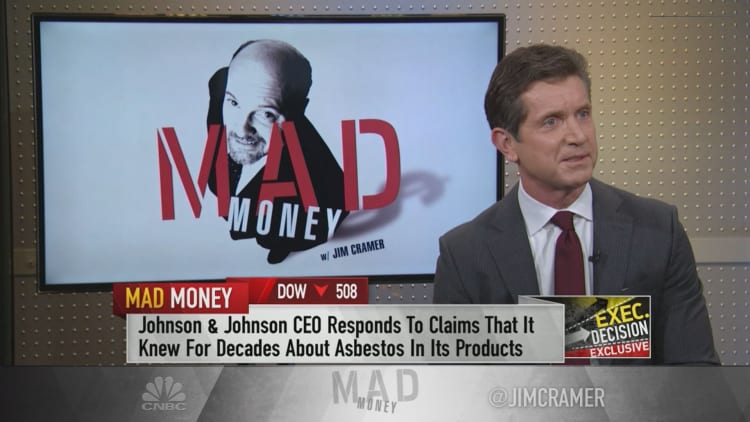
Johnson & Johnson's Chairman and CEO, Alex Gorsky, on Monday defended his company against reports claiming that it knew for decades about the presence of asbestos in its baby powder product.
"We unequivocally believe that our talc, our baby powder, does not contain asbestos," Gorsky told CNBC in an interview with Jim Cramer. "And that's demonstrated in thousands of studies, studies not only conducted by J&J, but studies conducted by independent authorities, well-respected authorities, where we work closely with regulators who are overlooking the methodology."
"By the way, throughout this process, we also not only use the best testing methodologies that are available, but we continue to improve them through the years," the CEO continued.
Shares of Johnson & Johnson plunged 10 percent on Friday in the stock's worst trading day in 15 years. They lost another 2 percent Monday, totaling roughly $50 billion in market value losses for the pharmaceutical giant.
The Reuters report, which said that Johnson & Johnson executives and other affiliated parties were aware from the 1970s to the 2000s that the company's talc materials sometimes tested positive for asbestos, was matched by the New York Times.
Gorsky, who has been the company's CEO since 2012 and has worked there since 1988, reiterated his company's categorical denial of the reports on "Mad Money," calling on stakeholders to believe the results of scientific testing and "look at the body of evidence in totality."
He cited studies from independent bodies including Harvard Medical School that tested 100,000 male and female patients who used the talc-based baby powder.
The studies, he said, found "no causation between talc, baby powder and ovarian cancer or any type of asbestos-related disease."
Gorsky also called into question a portion of the Reuters investigation that alleged that Johnson & Johnson did not tell the U.S. Food & Drug Administration, a federal agency that vets consumer products and medications before they go to market, that between 1972 and 1975, at least three tests from different labs found asbestos in its talc.
"What's really important in all these cases as you're reviewing the documents is to look at all the information in totality, especially when you're dealing with matters of science," he said. "And while there are documents that will refer to one testing methodology versus another, or an outcome, what we found is the outliers are either incomplete or, frankly, they're refutable based upon the methodology or the particular sample that they used."
He added that he couldn't believe that the same company that took Tylenol off the market during safety scares in the 1980s "would allow a product that they felt in any way could be harmful to stay on the market."
Later, addressing the many lawsuits alleging that asbestos in the company's talc-based baby powder caused ovarian and other types of cancers, he said that the science "simply doesn't support some of [the] correlations that are being drawn" by patients in the suits.
"We always have empathy and sympathy for patients that have been diagnosed with cancer. Look, we're in the business of trying to cure cancer," he said.
When asked to address apparent concerns two J&J employees raised, as alleged by The New York Times, Gorsky said you'd expect there to be debate or dialogue in any company.
"And frankly, that's healthy within an organization," he told Cramer. "What's really important to focus on is not to select just one document, one piece of evidence, but to look at they body of evidence in totality. And when you do that, in this case, again, we remain very confident in the safety of our products, but more importantly, the actions of our people."
—CNBC's Angelica LaVito contributed to this report.
Watch Alex Gorsky's full two-part interview here:

Disclosure: Cramer's charitable trust owns shares of Johnson & Johnson.
Questions for Cramer?
Call Cramer: 1-800-743-CNBC
Want to take a deep dive into Cramer's world? Hit him up!
Mad Money Twitter - Jim Cramer Twitter - Facebook - Instagram - Vine
Questions, comments, suggestions for the "Mad Money" website? madcap@cnbc.com



